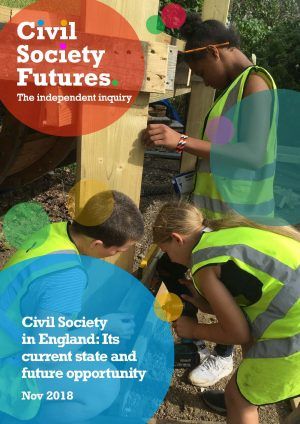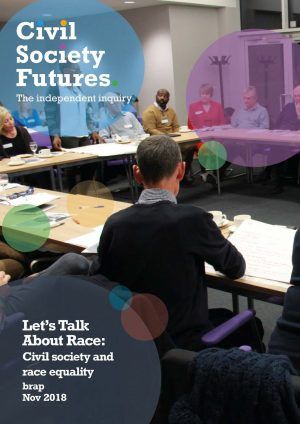As the Civil Society Futures inquiry concludes, I wanted to reflect on some of the journey we’ve had, a few of the criticisms, and what might come next.
Lessons learned
I’ve learned a lot in the last couple of years. I’ve learned that committing an inquiry to really listening and paying close attention is uncomfortable and challenges your dearest preconceptions. I’ve learned that curiosity is an incredibly important mode, and that it’s incompatible with judgement, and that’s quite uncomfortable for someone who is used to having to reach quick and rapid judgements. I’ve learned that working with a very diverse panel, and a team made up of a challenging collaboration of very different organisations is just as difficult as you might imagine. And as productive and creative as you could ever hope and dream.
I’ve learned that civil society is active everywhere in England, that it is under supported and that it is angry. I’ve learned that government – local, national, regional – is entirely dependent upon active, engaged civil society. I’ve learned that there are subjects we don’t talk about – like racism and the wound it represents in our country’s life, and there are subjects we love to talk about, like funding and why commissioning is the wrong model. I’ve learned how little trust there is within civil society, and how much we struggle with really difficult issues like power and accountability. And I’ve learned quite how much resentment there is about funders who are seen as extractive and not contributors and allies in the work. (And that hurts when you’ve been involved in funding decisions for a lot of your life).
And I’ve learned again something I think I always knew: that civil society is at its very best and has its maximum power when it is working to deeply connect within communities, between communities, between politicians and people who are angry, between institutions and networks and movements. And that people really want to belong, and that associational life is our biggest single asset.
Challenges and criticisms
There’ll be news and ideas about the future soon but as we come to the end of the year, I have been reflecting on the past few weeks and I want to reflect here on the challenges that have been made:
Government?
There’s been surprise, and maybe even dismay, that the report does not make a lot of calls on government to do things differently. And of course, that’s true: we ended up arguing that if civil society could be genuinely renewed and re-energised, then there would be no question that government would need to move.
But there was more to our approach than that.
It stemmed from a strong recognition that government is changing massively and that the primary relationships civil society has with the state are at so many different levels – and that in many ways some local authorities were championing a very different set of relationships with and around civil society. The new relationships that we saw being brokered in this emerging eco-system need much more examination but I was very struck by the new and creative ways local authorities in some places were developing deep connections, and were struggling to work collaboratively in incredibly difficult times.
A simple set of recommendations to central government felt inappropriate in that much more fluid, networked environment. And maybe glib in a time when the challenges to our democracy and to our social fabric are so profound. A confident civil society would – of course – be making demands of government, but too long we have waited for permission, and this is a central reason it wasn’t the focus of our final recommendations. It’s too easy to look elsewhere, when there’s so much change that starts with ourselves.
Impact?
There’s been a suggestion that the report is not sufficiently about impact, which has made me wonder if we are speaking the same language. The PACT isn’t ‘good things we should all do’ (although it is that too) – it’s actually at the heart of how we can all have greater impact.
We have emphasised so strongly the importance of connections and accountability in order to shift power, which are all about effectiveness and making a difference. We can only know what impact we need to make by being more closely connected to the people and communities we are there to serve. We can only make that impact by trusting in them to make decisions as experts about their own lives, and by being properly accountable to them in ways that are too often lost at the moment. The PACT really is at the heart of impact.
Across the inquiry outputs we tried to celebrate the very real difference that is made by effective civil society, but I don’t think that anyone any more thinks that impact is linear and measurable and readily linked to an input. Civil society is as messy as we’ve always said – it makes a huge difference, but it’s not tidy. What we’ve heard across England is that at the heart of real impact – not-neat, not-just-numbers impact – is power, accountability, connection and trust.
Prescriptions?
There have been challenges to us that the reports aren’t sufficiently prescriptive about what should happen next and how this massive recommended culture change will actually happen.
We intentionally were not too specific about lists of actions – partly because the PACT is about real reflection, about each of us examining and changing our own attitudes and practices, and that is deep, ongoing work that can be too easily lost when you start listing 10-point plans.
It is also an immense task to describe all that is needed for culture change across the whole of English civil society, when you think how different a national organisation like Shelter is to a local women’s shelter, the different experiences of a new online movement and a 200-year old charity.
We have attempted to offer some suggestions in the reports published so far and this list of ideas, but I recognise people want more. I hope that we can work on this more in 2019.
A journey, not a destination
We’ve called for a PACT – a new assertion of our values and the ways we want to work. I must admit that I have had a wry smile when people have told me that they’re already PACT compliant. I don’t believe it’s a destination, and I don’t think I’ve come across an organisation that would seriously think that it had made all the shift in behaviours and that the real change is only for others to make.
But I have been lucky enough to talk about the PACT with all sorts of organisations – inside and outside civil society – and have been so struck by the recognition in business, in government, in local authorities and in civil society that the world’s changing fast. That our place in it will not be protected by anyone other than ourselves.
Unless we address the ways we behave, we run the very real risk of irrelevance. And that won’t be bad for us – it will be devastating for the whole of society and will leave a real crisis for the next generation. That’s our responsibility.
This blog was first published on Civil Society Futures in December 2018. Re-posted with kind permission.

